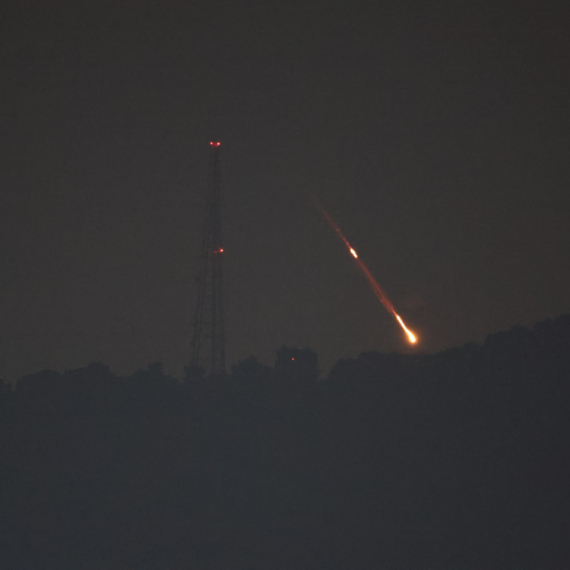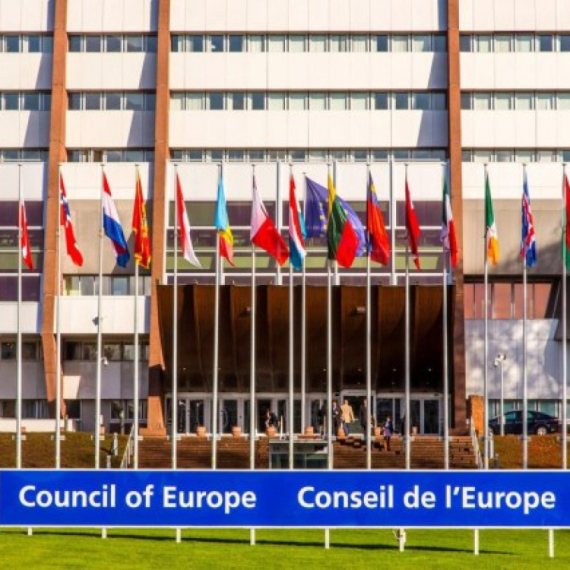Tadić announces "energy alliance"
Pres. Boris Tadić says Serbia and Bulgaria are "energy allies", and stresses that he expects the construction of the South Stream to begin as soon as possible.
Saturday, 25.04.2009.
13:02

Pres. Boris Tadic says Serbia and Bulgaria are "energy allies", and stresses that he expects the construction of the South Stream to begin as soon as possible. "We are carefully monitoring the negotiations that Bulgaria has with the Russian side on this issue and I hope that the construction of the gas pipeline will start as soon as possible." Tadic announces "energy alliance" "The direction of the pipeline in a way runs parallel to that of Corridor 10, which is of great benefit to Bulgaria," Tadic said after meeting his Bulgarian counterpart Georgy Prvanov in Sofia. According to the president, the South Stream pipeline will be a guarantee that the two countries will "never again" face gas shortage, such as the one at the start of the year, brought on by a Russia-Ukraine dispute. "Serbia will in the years to come build underground storages and in this way we will also be regional partners in moments of crisis, such as the one last winter," he said. Tadic stressed the importance of completing the works on the pan-European road Corridor 10, which will connect Nis in the south of Serbia to Sofia with a highway, and added that he believed Serbia would finish the Nis-Dimitrovgrad stretch "by the end of the current government's mandate". Tadic was also heard saying that "beside the fact that the bilateral relations of Serbia and Bulgaria are experiencing an upward trend", another fact – that the government in Sofia has recognized the Kosovo Albanian unilateral declaration of independence – is "unacceptable to Serbia". Prvanov for his part said that energy and economic cooperation between the two countries is very important from the point of view of the economic crisis that is affecting both Belgrade and Sofia. According to agency reports, he stressed that Bulgaria and Serbia will have a key role in the realization of the South Stream project, and that finalizing Corridor 10 and opening new border crossings is among the priorities for the two countries. On Friday, Tadic said that the Western Balkans, as the crossroads of oil and natural gas transport routes, can in the near future become a bridge that will contribute to the energy stability of the entire Europe. Speaking at the opening of an energy summit in Sofia, Bulgaria, Tadic said that the Western Balkan region is increasingly gaining in geo-political and geo-economic importance and that Serbia, as a country on the transit route between central Europe, the Caspian Basin and the Middle East, is the best place for building a future energy infrastructure. "Serbia aspires towards regional development and the stable supply of natural gas and this is why it is important that a gas pipeline from Bulgaria passes through it. In this manner, Serbia, along with alternative routes via Romania and Hungary, would become both a final destination and an important transit country for gas for the rest of Europe," he underscored. The president stated that Serbia should build new gas pipelines and announced that Serbia's public gas enterprise Srbijagas and Russia's Gazprom would soon set up a joint company to secure unimpeded flow of gas through Serbia. He added that Serbia is also actively participating in the Constance - Trieste oil pipeline project. The economically sustainable and safe transport of natural gas is possible only if the long-term interests of the exporters, the transit countries and the end users in that chain are satisfied, Tadic noted. "I am certain that genuine partnership between the links in the energy chain is a condition of safe and stable energy supplies," Tadic pointed out. The two-day energy summit in the Bulgarian capital, dubbed "Natural Gas for Europe - Security and Partnership", has gathered the representatives of 28 countries.
Tadić announces "energy alliance"
"The direction of the pipeline in a way runs parallel to that of Corridor 10, which is of great benefit to Bulgaria," Tadić said after meeting his Bulgarian counterpart Georgy Prvanov in Sofia.According to the president, the South Stream pipeline will be a guarantee that the two countries will "never again" face gas shortage, such as the one at the start of the year, brought on by a Russia-Ukraine dispute.
"Serbia will in the years to come build underground storages and in this way we will also be regional partners in moments of crisis, such as the one last winter," he said.
Tadić stressed the importance of completing the works on the pan-European road Corridor 10, which will connect Niš in the south of Serbia to Sofia with a highway, and added that he believed Serbia would finish the Niš-Dimitrovgrad stretch "by the end of the current government's mandate".
Tadić was also heard saying that "beside the fact that the bilateral relations of Serbia and Bulgaria are experiencing an upward trend", another fact – that the government in Sofia has recognized the Kosovo Albanian unilateral declaration of independence – is "unacceptable to Serbia".
Prvanov for his part said that energy and economic cooperation between the two countries is very important from the point of view of the economic crisis that is affecting both Belgrade and Sofia.
According to agency reports, he stressed that Bulgaria and Serbia will have a key role in the realization of the South Stream project, and that finalizing Corridor 10 and opening new border crossings is among the priorities for the two countries.
On Friday, Tadić said that the Western Balkans, as the crossroads of oil and natural gas transport routes, can in the near future become a bridge that will contribute to the energy stability of the entire Europe.
Speaking at the opening of an energy summit in Sofia, Bulgaria, Tadić said that the Western Balkan region is increasingly gaining in geo-political and geo-economic importance and that Serbia, as a country on the transit route between central Europe, the Caspian Basin and the Middle East, is the best place for building a future energy infrastructure.
"Serbia aspires towards regional development and the stable supply of natural gas and this is why it is important that a gas pipeline from Bulgaria passes through it. In this manner, Serbia, along with alternative routes via Romania and Hungary, would become both a final destination and an important transit country for gas for the rest of Europe," he underscored.
The president stated that Serbia should build new gas pipelines and announced that Serbia's public gas enterprise Srbijagas and Russia's Gazprom would soon set up a joint company to secure unimpeded flow of gas through Serbia.
He added that Serbia is also actively participating in the Constance - Trieste oil pipeline project.
The economically sustainable and safe transport of natural gas is possible only if the long-term interests of the exporters, the transit countries and the end users in that chain are satisfied, Tadić noted.
"I am certain that genuine partnership between the links in the energy chain is a condition of safe and stable energy supplies," Tadić pointed out.
The two-day energy summit in the Bulgarian capital, dubbed "Natural Gas for Europe - Security and Partnership", has gathered the representatives of 28 countries.

























































Komentari 0